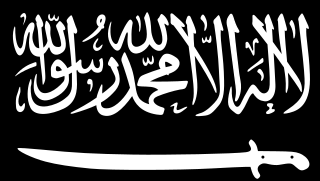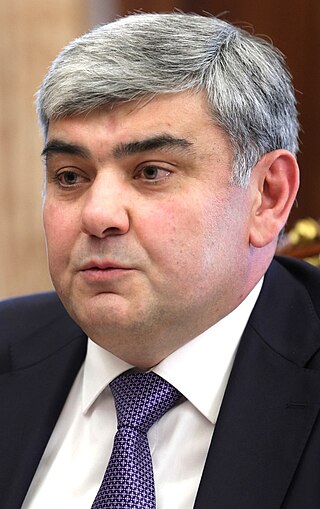Related Research Articles

The Caucasian Front, also known as Caucasus Front or the Caucasian Mujahideen, established in May 2005 as an Islamic structural unit of the Chechen Republic of Ichkeria's armed forces by the decree of the fourth president of the Chechen Republic of Ichkeria, Abdul-Halim Sadulayev. In September 2006, Ali Taziev was appointed as the emir and commander-in-chief of the Caucasian Front by Dokka Umarov. The group eventually reorganized as "Vilayat Nokhchicho" in 2007 and became a part of the Caucasus Emirate.

Khaled Youssef Mohammed al-Emirat, more commonly known as Muhannad, and also known as Abu Anas, was a Mujahid Emir (commander) fighting in Chechnya. Following the death of Abu Hafs al-Urduni on 26 November 2006, he was named leader of the battalion of foreign fighters once commanded by the notorious Saudi-born Ibn al-Khattab.

The United Vilayat of Kabarda-Balkaria-Karachay, also known as Vilayat KBK, was a militant Islamist Jihadist organization connected to numerous attacks against the local and federal security forces in the Russian republics of Kabardino-Balkaria and Karachay-Cherkessia in the North Caucasus. Vilayet KBK has been a member of the Caucasus Emirate group since 2007.

Anzor Astemirov, also known as Emir Sayfullah, was an Islamist leader of a terrorist group in the republic of Kabardino-Balkaria, in the North Caucasus.

The Caucasus Emirate, also known as the Caucasian Emirate, Emirate of Caucasus, or Islamic Emirate of the Caucasus, was a jihadist organisation active in rebel-held parts of Syria and previously in the North Caucasus region of Russia. Its intention was to expel the Russian presence from the North Caucasus and to establish an independent Islamic emirate in the region. The Caucasus Emirate also referred to the state that the group sought to establish. The creation of Caucasus Emirate was announced on 7 October 2007, by Chechen warlord Dokka Umarov, who became its first self-declared "emir".

Vilayat Galgayche, formerly known as Ingush Jamaat, was an Islamist militant organization connected to numerous attacks against the local and federal security forces in the Russian regions of Ingushetia and Chechnya in the North Caucasus. Since 2007 it has been a part of the Caucasus Emirate and takes part in the Insurgency in the North Caucasus. The group is thought to be responsible for the deaths of hundreds of people, mostly policemen, military personnel and officials.

The insurgency in the North Caucasus was a low-level armed conflict between Russia and militants associated with the Caucasus Emirate and, from June 2015, the Islamic State, in the North Caucasus. It followed the (Russian-proclaimed) official end of the decade-long Second Chechen War on 16 April 2009. It attracted volunteers from the MENA region, Western Europe, and Central Asia. The Russian legislation considers the Second Chechen War and the insurgency described in this article as the same "counter-terrorist operations on the territory of the North Caucasus region".
Balkar and Karachay nationalism is the national sentiment among the Balkars and Karachai. It generally manifests itself in:

Khuseyn Vakhaevich Gakayev, also known as Emir Mansur and Emir Hussein, was a mujahid Emir (commander) fighting in Chechnya. He was one of the most senior field commanders still operating in the North Caucasus prior to his death on 24 January 2013.
Ratmir Erikovich Shameyev, also known as Emir Zakariya, was a Kabardin Mujahid Emir (commander) fighting in the North Caucasus.
Alim Zankishiev, also known as Emir Ubaidallah, was the leader of the Kabardino-Balkaria-Karachai wing of the Caucasus Emirate organisation in the Russian Republic of Kabardino-Balkaria.

Kazbek Gekkiyev, a Russian TV news presenter and journalist for the All-Russian State Television and Radio Broadcasting Company (VGTRK) in Nalchik, Kabardino-Balkaria, Russia, was shot three times in the head and killed by a gunman outside of his workplace. The gunmen are believed to be linked to the Islamic insurgency in the North Caucasus. He was the seventh journalist killed in the North Caucasus in ten years in connection to his work.
Arthur Getagazhev, also known as Emir Abdullah or Ubaydullakh, was an Islamist militant leader in the Russian North Caucasus republic of Ingushetia.
Aliaskhab Alibulatovich Kebekov, also known as Ali Abu Muhammad, was a North Caucasian militant Islamist in Russia and the leader of the Caucasus Emirate following the death of inaugural leader Dokka Umarov. Following in the same religious tradition as Umarov, he adhered to the ideology of Salafism. The United States Department of State added Kebekov to its list of Specially Designated Global Terrorists on March 25, 2015. On 19 April 2015, Kebekov was killed by Russian security forces during special operations in the settlement of Gerei-Avlak in Buynaksk. An Avar by nationality, Kebekov was the first non-Chechen to lead the North Caucasus insurgency.

The Province of Nokhchicho was the Chechen-based wing of the Caucasus Emirate organisation. It was created in 2007 as one of the Emirate's six vilayats, replacing the Chechen Republic of Ichkeria.
Magomed Aliyevich Suleimanov, also known as Abu Usman Gimrinsky, was a Dagestani Islamist in Russia and the third leader of the Caucasus Emirate militant group.

The Islamic State – Caucasus Province is a branch of the militant Islamist group Islamic State (IS), that is active in the North Caucasus region of Russia. IS announced the group's formation on 23 June 2015 and appointed Rustam Asildarov as its leader. Although it was defeated militarily as an organized force by 2017, some lone wolves still act on behalf of the Islamic State.

Kazbek Valeryevich Kokov is a Russian politician. He is head of Kabardino-Balkaria since 3 October 2019 . He is the son of the first president of Kabardino-Balkaria.

The Insurgency in Kabardino-Balkaria and Karachay-Cherkessia was a protracted conflict between Russian security forces and militant groups operating in the regions of Kabardino-Balkaria and Karachay-Cherkessia, located in the North Caucasus region of Russia. The conflict was part of the broader insurgency in the North Caucasus, which emerged following the end of the First Chechen War in 1996.

The raid on the Baksan hydroelectric power station was a militant attack that took place on July 21, 2010, in Kabardino-Balkaria, a republic in the North Caucasus region of Russia. The attack was carried out by four gunmen affiliated with the Caucasus Emirate, an Islamist militant organization active in the region.
References
- 1 2 "Balkar, Kabardian Insurgent Leaders Reported Killed". Radio Free Europe/Radio Liberty. 29 April 2011. Archived from the original on 2011-08-08.
- ↑ "U.S. Designates North Caucasus Insurgency As Terrorist Organization". Radio Free Europe/Radio Liberty. 30 May 2011.
- ↑ "Two killed in attack on Russian power station". Reuters . 2010-07-21. Archived from the original on March 5, 2016.
- ↑ "North Caucasus Insurgency Admits Killing Circassian Ethnographer". Radio Free Europe/Radio Liberty. 10 January 2011.
- ↑ "Kabardino-Balkaria Insurgency Commander Killed". Radio Free Europe/Radio Liberty. 29 March 2012.